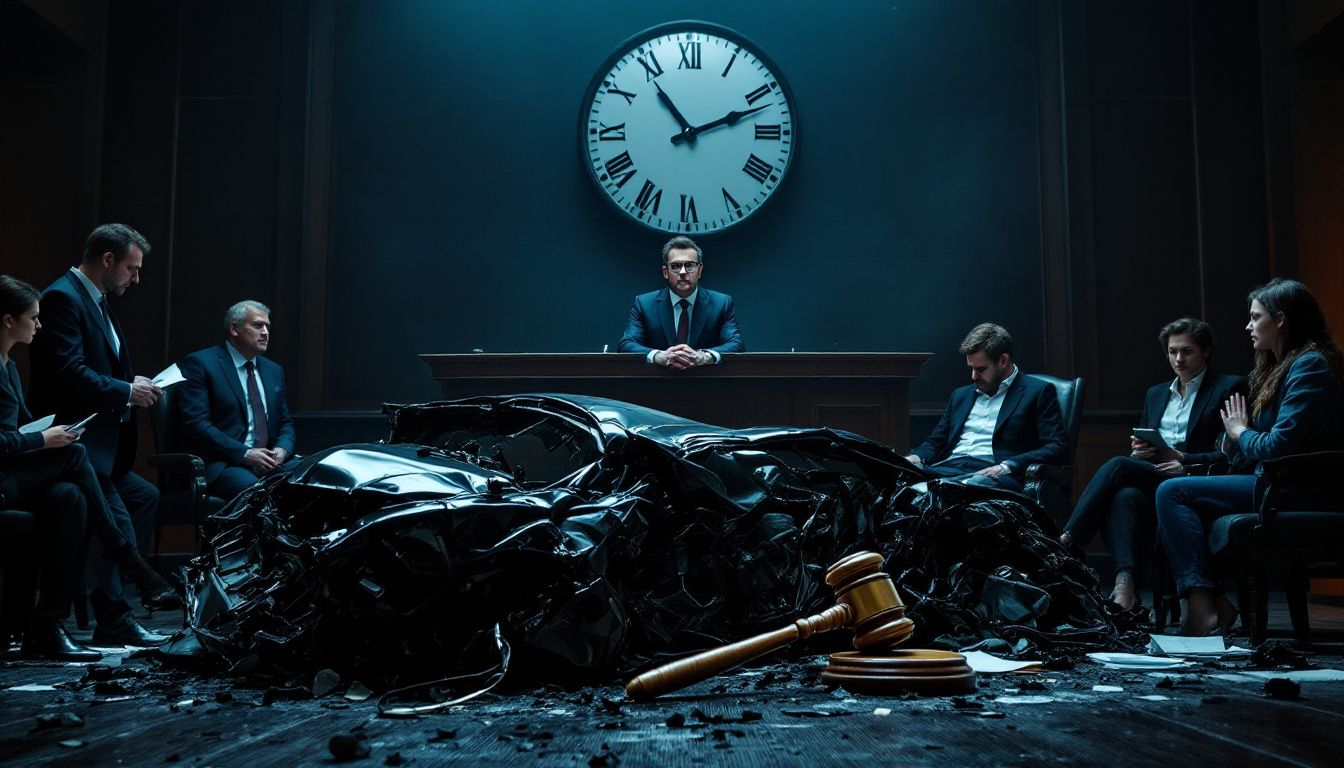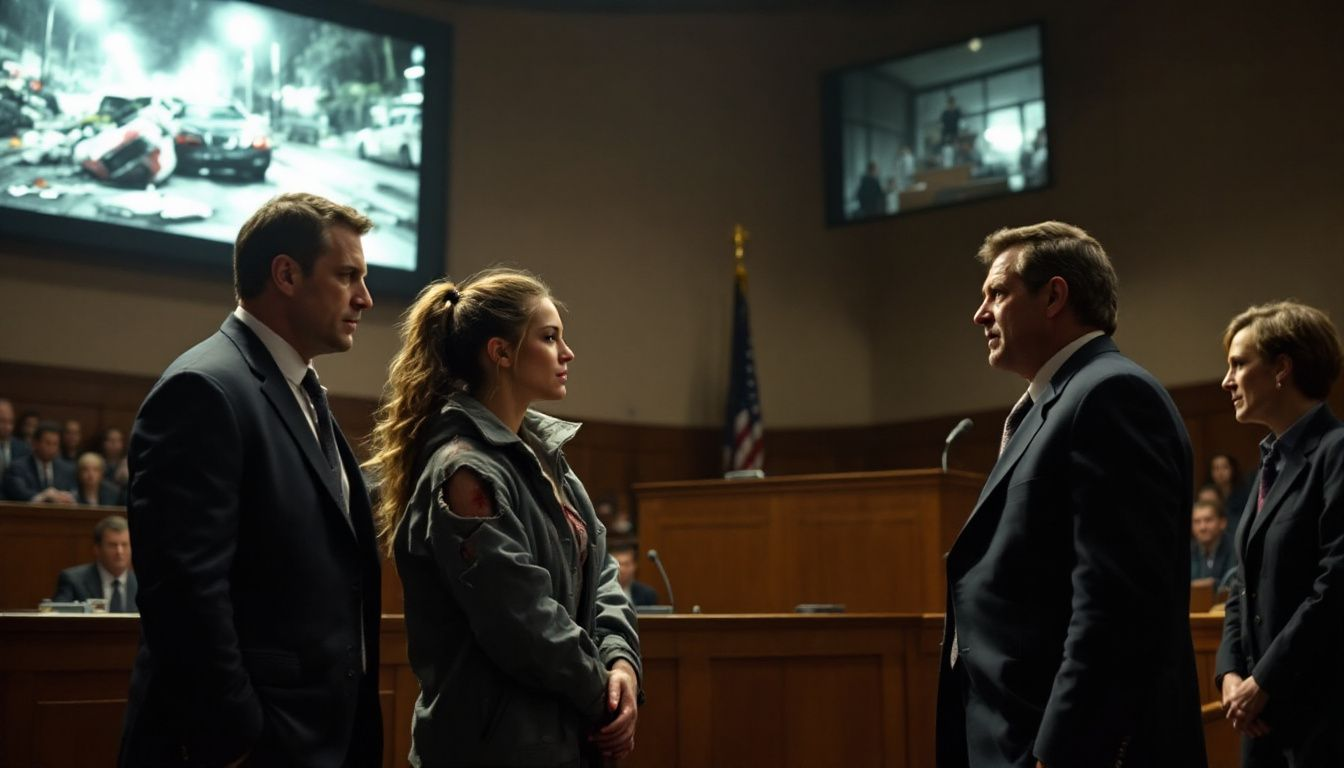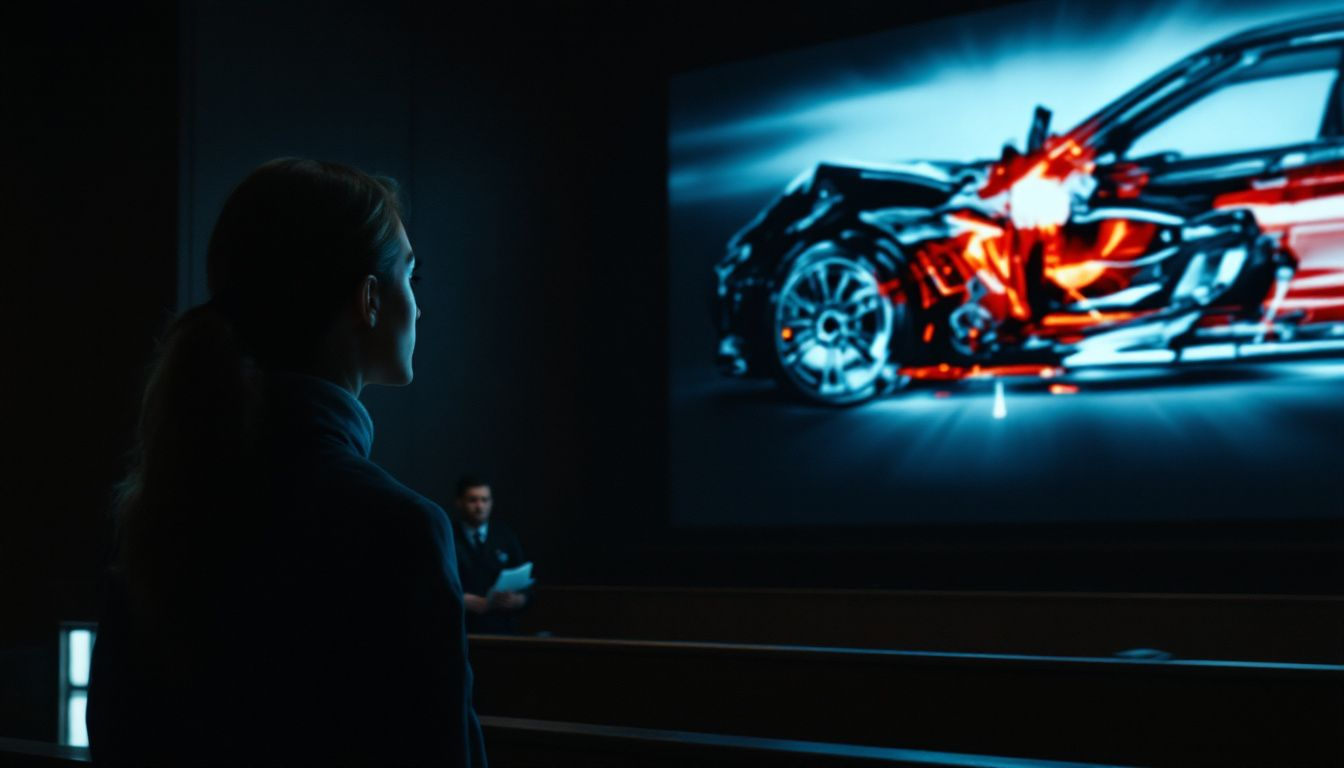Who Pays for Damages in a Borrowed Car Accident?
If you’re involved in a borrowed car accident, figuring out who pays for the damages and how insurance works can be confusing. In this article, we’ll break down the roles of both the car owner’s and your insurance, explore liability issues, and provide steps to take immediately after the accident.
Key Takeaways
- In a borrowed car accident, the owner’s insurance is typically the primary coverage, but the borrower’s own insurance may supplement it if damages exceed the owner’s policy limits.
- Liability in a borrowed car accident depends on permission to drive and fault in the accident; borrowers without permission face direct legal and financial consequences.
- Consulting an experienced car accident attorney is vital for navigating insurance claims and understanding legal rights, as they can help maximize compensation outcomes.
Understanding Insurance Coverage for Borrowed Cars

Understanding auto insurance coverage can be a complex matter, particularly with the principle that car insurance usually follows the vehicle rather than the individual driving it. Thus, in instances where you are driving a borrowed car and an accident occurs, it is typically the vehicle owner’s insurance policy that acts as primary coverage. This situation may become more complex if damage costs exceed what the owner’s policy covers or if certain exclusions within their policy come into play.
To navigate through such intricacies of auto insurance with greater ease, one must dissect it into two key elements: first, there is the car insurance policy belonging to whoever owns the vehicle. Secondly, comes any relevant own-insurance policies held by you – the borrower – should they need to contribute towards damages incurred while operating a borrowed car during an incident. Each has its unique function concerning financial protection under these circumstances.
Owner’s Insurance Policy
Typically, when a car owner grants explicit permission for someone else to drive their vehicle, the insurance of the car owner is considered the main source of coverage. This implies that in case you have an accident while driving a borrowed car, it is usually expected that any damages incurred—including those related to medical costs and property destruction—will be covered under the policy of the vehicle’s owner. Nevertheless, such coverage has its limits. Should claims exceed these specified limits within the policy, then your own insurance may be called upon to provide additional support.
For owners lending out their vehicles, it’s critical to verify that potential drivers are legally allowed behind the wheel with proper licensing credentials. Car owners must also recognize that if an accident were to happen during a period when another individual is operating their automobile (with consent), there exists a possibility for their personal insurance premiums to escalate as a result of this eventuality.
Borrower’s Own Insurance
When you borrow a car, the vehicle owner’s insurance typically serves as the main form of coverage. Should damages exceed what the car owner’s policy covers, your own insurance might be vital in handling extra expenses to make sure all damage costs are compensated. It is important for borrowers to check their personal insurance and familiarize themselves with state laws before operating a borrowed vehicle.
Before taking possession of a borrowed car, it’s wise to have an open discussion regarding coverage specifics with both the individual lending you their vehicle and their respective insurance carrier. Doing so can help avoid unexpected issues and provide clarity on what protections are in place in the event of an accident. Knowing these particulars can prevent future distress over finances or legal complications.
Determining Liability in a Borrowed Car Accident

Liability in a borrowed car accident can be complex, and influenced by various factors. While car insurance usually follows the vehicle, liability coverage can shift based on the circumstances and actions of both the driver and the vehicle owner.
Two critical aspects come into play when determining liability: whether the borrower had explicit permission to drive the car and who was at fault in the accident. Let’s dive deeper into these aspects to understand how they affect liability.
Permission to Drive
It is crucial to obtain explicit consent from the vehicle owner for their insurance policy to provide coverage. If an individual borrows a car without the owner’s permission and subsequently has an accident, this could result in significant legal and financial repercussions for that person. If vehicle owners permit individuals who lack both a valid driver’s license and proper insurance to operate their vehicles, they may find themselves legally accountable for expenses related to car repairs and any medical bills incurred.
To avoid potential legal issues and safeguard against financial jeopardy, it is imperative that vehicle owners ensure anyone borrowing their car possesses not only a legitimate driver’s license but also has been granted clear authorization to use said vehicle.
Fault in the Accident
Determining who is at fault in an accident involving a borrowed car affects the allocation of damages for compensation. The liability hinges on establishing fault, which is essential when seeking to obtain compensation from the appropriate individual. Should it be determined that the borrower was negligent or acted recklessly, they could be deemed responsible for any resulting harm.
The fact that an individual was operating a vehicle they had borrowed does not absolve them from being liable if their behavior led to the collision. Those who have suffered injuries, as a result, can bring legal action against the driver in hopes of receiving recompense for their losses.
Legal Principles: Negligent Entrustment and Maintenance
The doctrines of negligent entrustment and negligent maintenance play a crucial role in determining fault when an accident involves a car that has been loaned out. The responsibility may fall on the vehicle owner if they did not demonstrate due diligence in either deciding who to lend their car to or ensuring its upkeep.
It’s important for both the owners of cars and those who borrow them to be aware of these legal theories, as ignorance could result in unforeseen liabilities. Along this, we will delve into these concepts more thoroughly.
Negligent Entrustment
The doctrine of negligent entrustment places responsibility on vehicle owners who permit an unqualified individual to drive their car. Should a vehicle owner provide access to their automobile to someone with a known record of irresponsible driving, or someone lacking a proper driver’s license, they could be considered culpable for accidents that ensue from such negligence.
It is crucial for owners to meticulously evaluate the driving track record and capabilities of any person they consider allowing to use their car. Overlooking this can result in grave legal repercussions and substantial monetary liabilities for the owner.
Negligent Maintenance
Negligent maintenance pertains to the irresponsibility of vehicle owners in maintaining their cars to be safe for driving. In instances where an accident happens as a result of inadequate upkeep, regardless of the driver at the time, the owner may be deemed negligent and held responsible.
It is incumbent upon owners to sustain their vehicles in a secure and functional state. By conducting consistent maintenance reviews and undertaking necessary repairs, they can prevent being liable for accidents that stem from mechanical breakdowns.
Steps to Take After a Borrowed Car Accident

Taking prompt and proper measures following an accident with a borrowed car is crucial as it can greatly influence the outcome of insurance claims and any legal matters that may arise. Being aware of these vital actions can safeguard both the individual who borrowed the vehicle and the owner against additional issues.
The essential steps to follow after experiencing a collision in a borrowed car include notifying authorities about the incident, reaching out to insurance companies involved, and obtaining medical care if necessary.
Reporting the Accident
It is imperative to file a police report right away following an accident involving a borrowed car. This report acts as a vital document for any subsequent insurance claims, ensuring there’s an official record of the incident. Collecting evidence while at the scene of the accident, including pictures of both the damage and injuries incurred, along with gathering witness details, is paramount.
Securing photographic or video documentation of the scene along with obtaining contact information from witnesses and exchanging particulars with the other driver can significantly bolster your insurance claim by clarifying who was at fault.
Avoid Long Discussions with Insurance Companies
After being involved in a car accident, you’ll want to inform your insurance company immediately to begin the claims procedure — but before you do so, make sure to consult an attorney, first. Insurers are not your allies, and they will look to identify sensitive disclosures that you make during these discussions so that they can reject or underpay you for your claims.
Note: when the incident involves a borrowed vehicle, the person who borrowed it should file the claim.
To ensure you receive just compensation for any damages and injuries sustained, seek guidance from a seasoned car accident lawyer who can help you maneuver through the intricate claims process effectively.
Seeking Medical Attention
Individuals who sustain injuries in a car accident involving a borrowed vehicle must promptly obtain medical attention to avoid any possible worsening of their injuries.
It’s crucial to undergo a comprehensive medical examination, regardless of the perceived severity of the injuries. Doing so not only safeguards your health and well-being but also generates vital records for supporting personal injury claims.
Impact on Insurance Rates

A borrowed car accident can affect the insurance rates of both the car owner and the borrower. Knowing how these rates might change can help prepare for potential financial impacts.
Let’s examine how an accident can impact the insurance rates for both the car owner and the borrower.
Owner’s Insurance Rates
If an individual is involved in a car accident while driving a vehicle they borrowed, the auto insurance rates of the actual owner may go up. This can happen regardless of whether or not the owner was to blame for the incident, especially if the coverage from the borrower’s own auto insurance company doesn’t fully pay for all damages.
Should it be determined that the person who borrowed and drove the car is at fault for causing an accident, then this could result in increased insurance premiums for the vehicle’s owner because of associated claims. In essence, accidents involving borrowed cars can cause premium hikes for owners due to how claims are processed irrespective of who was at fault.
Borrower’s Insurance Rates
Should a borrower be deemed at fault in a collision, the specifics of the incident along with their driving record could lead to higher insurance premiums. Insurance firms frequently impose surcharges on drivers involved in accidents, influencing the rates applicable to the borrower.
The financial well-being of a borrower can be adversely affected if they are held liable for an accident, as this may result in elevated insurance costs.
Alternative Legal Strategies
If insurance coverage falls short, pursuing other legal tactics might be necessary to obtain compensation for damages, offering extra methods for financial recompense.
We will delve into two frequently utilized legal approaches: initiating a lawsuit against the driver and filing suit against the owner of the vehicle.
Suing the Driver
Initiating a lawsuit directly against the driver responsible for causing a car accident is typically the main approach to obtain compensation for damages incurred. Under specific circumstances, pursuing legal action against the owner of the vehicle can also be an option, particularly if it’s determined that they irresponsibly allowed an unskilled or careless driver to operate their vehicle.
By filing direct lawsuits, victims ensure that accountability is placed on those at fault and work towards securing the appropriate recompense for their losses.
Suing the Vehicle Owner
Initiating a lawsuit against the owner of a vehicle can prove beneficial when the driver responsible for an incident is inadequately insured. By targeting the vehicle owner’s insurance, those filing suit may access a more satisfactory pool of funds for compensation.
In situations where defendants have operated vehicles that do not belong to them, plaintiffs might choose to pursue legal recourse against the individual who owns the car. This approach offers an alternative path to secure damages and is particularly useful in intricate scenarios where drivers are utilizing borrowed cars.
What if the Car Was Stolen?
Driving a borrowed car without the consent of its owner can have severe legal repercussions and may result in insurance claims being rejected. In instances where an unauthorized driver is involved in a collision with a stolen vehicle, it’s likely that the vehicle owner’s insurance policy will not provide coverage for the event, and typically, responsibility does not fall on the owner for actions taken by someone who has stolen their car.
Both parties—the individual behind the wheel and the rightful proprietor of an automobile—encounter substantial hazards such as financial obligations and judicial difficulties when said automobile, which has been illicitly acquired, figures into a mishap. Comprehending these dangers is imperative to safeguard oneself against possible legal ramifications associated with accidents involving stolen vehicles.
Liability in Unauthorized Use
In instances where an individual takes a car without consent and is involved in a collision, that person could be held accountable for any resulting harm. Provided the driver was not given authorization to operate the vehicle, the owner of the car is typically absolved of responsibility. This situation prompts significant considerations regarding accountability and potential legal ramifications following unauthorized vehicle use.
The act of using someone else’s car without their approval can result in substantial economic obligations and judicial repercussions for the non-permitted driver. It is essential to comprehend these consequences thoroughly to evade harsh sanctions and secure adequate legal defense.
Legal Recourse for Owners
If someone operates a vehicle without the consent of its owner, the responsibility for any resulting harm typically rests with the motorist rather than with the vehicle’s proprietor. Nevertheless, should issues emerge stemming from negligent entrustment or comparable reasons, the car’s owner is entitled to take legal measures against that at-fault driver and seek compensation for incurred damages.
When an incident involves a purloined automobile, securing damage claims can prove problematic for owners due to the unapproved nature of its use. In such intricate situations where legalities become particularly convoluted, enlisting an experienced lawyer is crucial in safeguarding the rights of the owner and effectively navigating through these complex challenges.
Consulting with an Experienced Car Accident Attorney

Consulting with an experienced car accident attorney is critical due to the complicated nature of cases involving borrowed vehicles. These attorneys are instrumental in seeking damages compensation and offer valuable guidance throughout the claims process, which often leads to more favorable results for the individuals involved.
It’s crucial to have legal advice when dealing with insurance intricacies and grasping the legal nuances that come with accidents involving a borrowed car. The advantages of engaging a seasoned car accident lawyer cannot be understated in these situations.
Free Consultation Services
Numerous law firms specializing in car accidents provide complimentary first-time consultations to assess potential cases and examine questions of fault. A prime example is 1-800-THE-LAW2, which maintains a network of car accident attorneys who are willing to offer professional advice during these free consultations without requiring any upfront payment.
At no cost, individuals can consult with an attorney for car accidents through 1-800-THE-LAW2. They advocate for those involved in such incidents to swiftly reach out to an adept lawyer within their network for support.
Benefits of Legal Guidance
A lawyer is adept at handling insurance claims, providing crucial assistance to clients in identifying the relevant policies, and executing claims proficiently. The legal expertise they offer plays a critical role in making sure that individuals are aware of their rights and duties following an accident, which can substantially influence the result of their insurance claim process.
Offering complimentary consultations, numerous attorneys specializing in car accidents give prospective clients the opportunity to obtain professional advice without any upfront costs. Engaging an attorney enhances the likelihood of securing equitable compensation and provides tranquility during the tense period following a car accident.
Summary
Dealing with the aftermath of an accident involving a borrowed car can be complex, encompassing both legal and financial challenges. It’s essential to grasp how insurance coverage functions, ascertain who is liable, and know what actions should be taken following the incident in order to safeguard both the individual who borrowed the vehicle and its owner. Our thorough analysis has covered vital details about insurance policies, legal concepts, and their effects on insurance premiums to help manage such circumstances adeptly.
To sum up, whether you’re someone who has borrowed a car or you are the owner of that vehicle, being knowledgeable and proactive serves as your greatest form of protection. Seeking advice from an experienced car accident attorney offers critical legal counsel required for effectively overcoming these obstacles. Bear in mind that being thoroughly informed equips you with strength—this understanding could prove pivotal when faced with repercussions stemming from a vehicular mishap.
Frequently Asked Questions
What happens if someone borrowed my car and won’t give it back?
If someone won’t return your car, you need to rescind their permission to use it and gather documentation to report it as stolen, since it was initially borrowed with your consent.
How does insurance work if someone borrows your car?
Insurance typically follows the vehicle, meaning that as long as your car is insured and you give permission, it should be covered when someone else drives it. This is known as “permissive use,” allowing licensed drivers not listed on your policy to operate your car without affecting your coverage.
What happens if I get into an accident in a borrowed car?
If you get into an accident in a borrowed car, your insurance policy typically provides coverage, as it is tied to the vehicle rather than the driver.
However, specific coverage will depend on the details of the accident and your policy terms.
What should I do immediately after a borrowed car accident?
It is essential to create a police report, document evidence at the scene of the accident, and promptly inform your insurance company following an incident involving a borrowed car.
If you sustain injuries in the collision, it’s also vital to obtain medical attention without delay.
Whose insurance covers the damages in a borrowed car accident?
In a borrowed car accident, the car owner’s insurance usually serves as the primary coverage, while the borrower’s personal insurance may cover any damages that exceed the owner’s policy limits.




